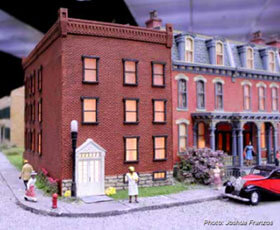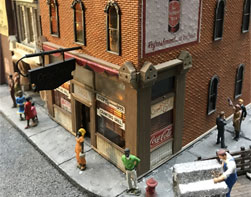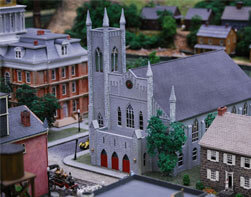
The Science Center Celebrates
Black History Month
2025’s Black History Month theme is “African Americans and Labor”.
From the Association For The Study Of African American Life And History:
The theme, “African Americans and Labor,” intends to encourage broad reflections on intersections between Black people’s work and their workplaces in all their iterations and key moments, themes, and events in Black history and culture across time and space and throughout the U.S., Africa, and the Diaspora. Like religion, social justice movements, and education, studying African Americans’ labor and labor struggles are important organizing foci for new interpretations and reinterpretations of the Black past, present, and future. Such new considerations and reconsiderations are even more significant as the historical forces of racial oppression gather new and renewed strength in the 21st century.
Read more about this year’s theme here. ![]()
During Black History Month, we celebrate the amazing and groundbreaking influences of notable Black scientists that left indelible marks on STEM fields (science, technology, engineering, and math).
Live Demonstration Shows:
Story Time Under the Stars
View our Daily Calendar for show times!
Early learners and their grown-ups are invited to learn more about Black STEM professionals and enjoy science-themed stories under a starry sky! Relax under a starlit sky as our planetarium educators read stories under a bright and beaming Moon.
Books include:
Additional Resources
Black-Owned Business Guide in Pittsburgh ![]()
A guide from Visit Pittsburgh that lists and links to local Black-owned businesses and events.
Black AF in STEM Collective ![]()
From their about page: The BlackAF in STEM Collective seeks to support, uplift, and amplify Black STEM professionals in natural resources and the environment through professional development, career connection, and community engagement. We aim to inspire new audiences to engage in nature and share the stories of Black conservationists from across the African diaspora.
Black Urban Gardeners and Farmers of Pittsburgh ![]()
From the Pittsburgh Foundation: Black Urban Gardeners and Farmers of Pittsburgh educates and assists black people in maintaining gardens and small farms to address the food desert problem that persists in many majority-Black communities.
Exhibit spotlights

Image courtesy of Joshua Franzos
The Hill District Home of Daisy Lampkin, a Famous Suffragist
Daisy Lampkin, a dynamic Pittsburgh woman who was a leader in the civil rights and women’s suffrage movements and who lived on Webster Avenue in Pittsburgh for most of her adult life was the Miniature Railroad & Village honoree in 2020. Mrs. Lampkin started her public career in 1912 and her priorities were organizing efforts to end discrimination against and oppression of all African Americans and specifically Black women. She was active in many civil, political, community, and church-affiliated groups and blazed the trail for women in the National Republican Party and National Association for the Advancement of Colored People. During her tenure as a stockholder and executive at the Pittsburgh Courier newspaper, she led it to become the most widely distributed Black publication in the nation. Mrs. Lampkin also led a fundraising effort in Allegheny County to raise $2 million in war bonds to support the United States during WWII. A model of the Lampkin’s three-story home in the Hill District — which served as her headquarters for teas, meetings, and strategic planning —and a figure in her likeness are now on display in the Miniature Railroad. She made an indelible mark on the future of Black Americans and American history, and the Science Center is proud to recognize her legacy in this way.

Image courtesy of Joshua Franzos
Pittsburgh Courier Building
The Pittsburgh Courier, published in Pittsburgh’s Hill District, had a national and international importance far beyond its home in the city’s “Little Harlem” neighborhood. From 1910 until his death in 1940, Robert Lee Vann served as editor and owner of the noted newspaper. He brought aboard many talented staff to achieve his dream of a successful Black newspaper in Pittsburgh, and its circulation skyrocketed. A crusading weekly that advocated for racial equality, the Courier achieved a circulation of 400,000 by 1947. This building was later demolished, and the model had to be reconstructed from views in old photographs to add this story to the experience of the Miniature Railroad & Village®.

Image courtesy of Joshua Franzos
The LeMoyne House
The LeMoyne House is a two-story sandstone structure built in 1812 by Dr. F. Julius LeMoyne in Washington, PA, about 30 miles southwest of Pittsburgh. Though many additions and changes have been made to the building, the replica is based on its original design and features the distinctive rooftop garden where Dr. LeMoyne grew medicinal herbs and raised honeybees. Not only was he a successful physician, Dr. LeMoyne and his family were very active in the Underground Railroad, and his house served as the epicenter of antislavery activity in southwestern Pennsylvania from the 1830s through the abolition of slavery.

Crawford Grill
In addition to the world-class jazz that became its claim to fame, Crawford Grill was also equal parts town hall, boardroom, and bank. Crawford Grill opened in the early 1930s under Gus Greenlee, a money lender and numbers runner who also turned the Pittsburgh Crawfords into a winning Negro League baseball team. The restaurant had three floors, the second with a glass-topped bar and a revolving stage for musicians playing the famous mirrored upright piano. Harlem Renaissance poet Claude McKay dubbed the Grill the “crossroads of the world” for its many headliners, including Louis Armstrong, Count Basie, Billy Eckstine, Duke Ellington, Ella Fitzgerald, and countless others, who often showed up at the Crawford Grill for a visit and usually a jam session after performances in prestigious downtown theaters.

Ebenezer Baptist Church
When the Ebenezer Baptist Church burned down in the Hill District in 2004, it sent shockwaves through the community. Ebenezer Baptist is the oldest Black Baptist congregation in Pittsburgh and the first to own a church building—its origins can be traced back to 1875. Ebenezer Baptist Church stood as a pillar for the burgeoning Civil Rights Movement in the United States. In 1932, the church hosted the National Urban League Conference. The Urban League was founded in New York City in 1910 to help Black migrants from rural areas adjust to city life, but over the years it has expanded its focus to include a wide array of economic and social issues facing the Black community. Civil Rights leaders Martin Luther King, Jr. and Jesse Jackson both gave speeches at the church.
Two firefighters lost their lives when the bell tower collapsed as the crew fought the blaze. To honor those firefighters, the Miniature Railroad staff constructed the model’s bell tower with scorched wood from the original structure. The model also houses a small time capsule with firefighter patches and remembrances from the congregation and community.
Check out this featured Café Sci presentation:
Go ahead and hate your neighbor: What science can tell us about why we hate and how we can change ![]()
In this Q&A session from 2024, Tracy Baton, a social worker, anthropologist, and historian, looks into the science of understanding hate and intolerance. She discusses why many of us are quick to hate our neighbors, how hate is sometimes fostered, and what science can tell us about how we can change.
About Tracy Baton

Tracy C. Baton, MA LCSW
Lead Clinician, Hugh Lane Wellness
Tracy Baton (she/her) is a Black queer cis-female psychotherapist, community organizer, anthropologist, historian, and clinical social worker from Pittsburgh. She grew up in Pittsburgh’s Hill District and Squirrel Hill neighborhoods and has asked questions about human rights since high school. Tracy attended the University of Pittsburgh, earning a Bachelor’s in medical anthropology focusing on South Africa. In addition, she attended the University of Florida, where she received a Master’s in Medical Anthropology and a Master’s in African History before returning to Pittsburgh and earning her Master’s in Social Work. Among her many honors are the William J. Fulbright (IIE) Fellowship and the Linda S. Vance Award for Historical Writing on Women. She did her field research on women’s labor in rural South Africa. Upon her return to the US, she won two “Best of Pittsburgh” awards for peaceful First Amendment protest as leader of the Women’s March – Pittsburgh. She worked as an anti-racism organizer for Mennonite Central Committee and as a private psychotherapist. She is the lead clinician at Hugh Lane Wellness Foundation, working with LGBTQ+ youth and families. She loves gardening and antiques. She is also delighted to be the mother of three daughters and the nana of two grandchildren.
Katherine Johnson (Image credit: NASA); Mae Jemison (Image credit: NASA); Mary Jackson (Image credit: NASA); Percy Julian (Image courtesy of the Historical Society of Oak Park and River Glen); Percy Julian (Image credit: The United States Postal Service); Neil deGrasse Tyson (Image credit: Neil deGrasse Tyson); Emmett Chapelle (Image credit: NASA)

